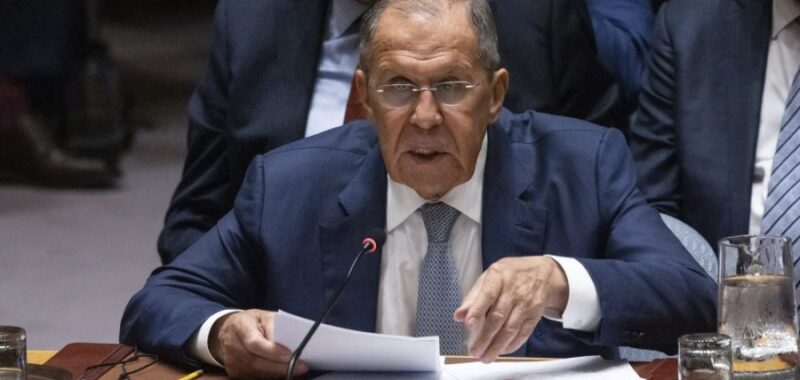
Russia’s stony-faced foreign minister is getting paranoid. Sergei Lavrov believes that “at present, about 50 countries are trying to break up Russia.”
But, Lavrov told the assembled professors and students of the elite Moscow State Institute for International Relations, this is nothing new. Western countries have always aspired to break up Russia so as to produce a “dependent” and “dying space” with which they would be able to do what they desired. “Dismembering” Russia is the ultimate goal.
Lavrov purposely used two words — “razvalit'” and “razchlenit’” — that focus not on Russia’s diminution as a power player or even its destruction as a state, but on its composition of disparate territories, economic regions and nations.
As veteran Russia-watcher Paul Goble notes, “the paranoia Lavrov manifests in making such a statement is noteworthy because of what it says about the thinking in the Kremlin concerning the fragility of the world’s last remaining empire.”
Clearly, Lavrov and his Kremlin comrades are worried both about supposed Western efforts to break up Russia and about the genuine centrifugal tendencies within the Russian Federation.
The first concern is unfounded. I can think of no country, in the West or elsewhere, that actively aspires to Russia’s break up. They may want a weaker, kinder or more gentle Russia, but the same reluctance to countenance the USSR’s break up in the late 1980s — as evidenced by President George H.W. Bush’s infamous “Chicken Kiev” speech in 1991 — is still alive and well today. Dismemberment conjures up images of refugee waves, civil war and “loose nukes,” tempering whatever enthusiasm policymakers might otherwise have for the break-up scenario.
Lavrov’s fears of Western intervention are thus nothing but a manifestation of a deep-seated paranoia. And his claim that some 50 countries want to dismember Russia is downright absurd. There may be 50 analysts outside of Russia, or some multiple thereof, who want that outcome and argue for it, but there are no policymakers among them.
Which is too bad, inasmuch as Armageddon is the least likely of the outcomes of Russia’s dismemberment. The non-Russian regions have administrations, boundaries and traditions of self-rule. The expectation that they would resort to violence is rooted only in racism.
A rump Russia, rid of its non-Russian colonies and imperial mindset, would be far more inclined to become democratic and open to the West. And whoever succeeds Vladimir Putin is no more likely than he to engage in irresponsible nuclear saber-rattling.
No, dismemberment will be the result not of Western policy, but of Putin’s policies — above all the catastrophic war in Ukraine. Not only has it has demonstrated Russia’s weakness, but it has also unleashed socio-economic chaos within Russia and growing demands by Russia’s non-Russian peoples for a greater voice in their own affairs.
The Ukrainians, like the Chechens before them, have withstood mighty Russia’s assault, bloodied it in the process, and may even win the war. Putin has transformed Russia into a weak state with a brittle regime; he is a decrepit leader with declining imagination and legitimacy. The non-Russians will effectively be forced to jump ship by Putinite Russia’s multiple failures — just as they did in the late ’80s and early ’90s, when a so-called “parade of sovereignty declarations” almost led to Russia’s break up.
Lavrov and Putin are fully cognizant of that parade and therefore smell trouble even where there isn’t any. That’s paranoia. But Lavrov and his ilk also suffer from hubris, as manifested by their inability to see that they are not Russia’s saviors, but its gravediggers. To top things off, they also evince an inferiority complex when they demand to be taken seriously while knowing no one would take them seriously, were they not rattling the nuclear sabre.
Lavrov may take comfort from the fact that his blend of psychological problems is shared by Yelena Välbe, a former Olympic cross-country skiing champion who now heads the Russian Ski Federation. When recently asked when Russia would return to international sports, she opined:
“I will probably say things that should not be said at all. It seems to me that if we had thrown a serious bomb into the center of London, everything would have ended by now, we would have been allowed everywhere. Russia’s struggle with the entire outside world has been going on for centuries. They have never loved us, even when they pretended to love us. They always stand with a sharpened weapon behind their back. I love it when our country is strong and, probably, our strength irritates the whole world.”
No, Miss Välbe, it’s not your strength that irritates the world. It’s your casual willingness to drop a bomb on London and kill millions. Why worry about future loose nukes when the likes of Putin, Dmitry Medvedev and scores of other highly placed Russians are willing to compensate for their sense of inferiority by lobbing serious bombs today?
Alexander J. Motyl is a professor of political science at Rutgers University-Newark. A specialist on Ukraine, Russia and the USSR, and on nationalism, revolutions, empires and theory, he is the author of 10 books of nonfiction, as well as “Imperial Ends: The Decay, Collapse, and Revival of Empires” and “Why Empires Reemerge: Imperial Collapse and Imperial Revival in Comparative Perspective.”

